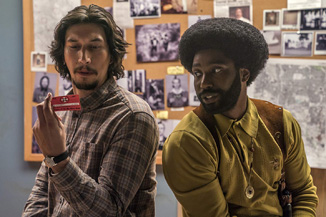|
|
Movie Review: BlacKkKlansmanBy Matthew HuntleyAugust 30, 2018
Stallworth, professional and articulate, and who doesn't pronounce his “r”s as “r-ah,” answers an ad in the paper recruiting new KKK members by pretending to be a white man. He calls up the local chapter's president, Walter Breachway (Ryan Eggold), and enlists white detective Flip Zimmerman (Adam Driver) to go as his face. Stallworth believes he and Zimmerman can work together to not only learn about the inter-workings of the KKK and its potential illegalities, but also prevent rumored upcoming attacks and cross burnings, including one scheduled at Colorado College, where Stallworth's new girlfriend, the fiery and outspoken Patrice Dumas (Laura Harrier), runs the black student union and is a firm believer in the liberation of “her people.” Stallworth keeps Patrice in the dark about his real job as his operation with Zimmerman gains more traction. He even goes so far as to befriend and set up a meeting with staunch KKK leader and “Grand Wizard” David Duke (an eerily convincing Topher Grace). It's not easy, though, and there are several close calls where Stallworth and Zimmerman's cover is almost blown, especially by the more fanatic Klan members who are always suspicious about Zimmerman's loyalty and real identity (“You sound different on the phone.”). But their investigation eventually culminates with Zimmerman's induction ceremony into the KKK and a tragic climax that mostly feels like the work of a screenwriter (as opposed to how actual events played out) but is nonetheless effective. Despite being a genre picture, Lee and his writers devote an impressive amount of screen time to the characters discussing thoughtful topics like racial identity, race loyalty, and the role cinema plays in shaping values. These, in turn, raise questions for the audience, like what is expected of you if you're white, black or Jewish? Should you automatically think and behave a certain way? If you don't always put your race first, especially if you're a member of a persecuted race, are you a traitor? Should we feel guilty for performing our day jobs, which sustain and feed us, if they perpetuate a system that does other people harm? What are the ramifications of patronizing an art form that can often be detrimental to and misleading about the types of people it portrays? Are “good” stereotypes necessary to deflate the bad ones? Such questions have been asked before, but they're refreshed here, and one of the most powerful aspects of “BlackkKlansman” is it doesn't leave the audience out of the conversation or let us off the hook. It really pushes us to deliberate on what it's saying. And in light of this country's recent tragic events with regard to race, particularly between blacks and white supremacists, it should absolutely be pushy because its questions are more relevant than ever. In fact, Lee tops the film off with a disheartening and, in my case, tear-inducing, sequence that illustrates the recent resurgence of violence and devastation that can arise when racism is practiced and tolerated. “BlackkKlansman” is thoughtful, entertaining and thrilling, a stirring film that occupies our minds and heart long after leaving the theater. It reiterates a message we've heard before but obviously not enough, because if we did, it wouldn't be so easy to draw parallels between the film's events, which took place 40 years ago, and those happening today.
|

|
|
|

|
Thursday, October 31, 2024
© 2024 Box Office Prophets, a division of One Of Us, Inc.


